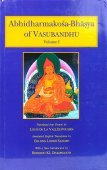Nitartha, Nītārtha, Nita-artha: 4 definitions
Introduction:
Nitartha means something in Buddhism, Pali, Hinduism, Sanskrit. If you want to know the exact meaning, history, etymology or English translation of this term then check out the descriptions on this page. Add your comment or reference to a book if you want to contribute to this summary article.
In Buddhism
Mahayana (major branch of Buddhism)
Source: academia.edu: A Study and Translation of the GaganagañjaparipṛcchāNītārtha (नीतार्थ) refers to “(the scripture of) explicit meaning”, according to the Gaganagañjaparipṛcchā: the eighth chapter of the Mahāsaṃnipāta (a collection of Mahāyāna Buddhist Sūtras).—Accordingly, “What then, the son of good family, is memory (dhāraṇī)? [...] (9) knowledge of the entrance into understanding the scripture of explicit meaning (nītārtha-sūtra); (10) knowledge of the entrance into understanding the scripture of implicit meaning; (11) knowledge of the teaching on the imperishable concealed truth; [...]

Mahayana (महायान, mahāyāna) is a major branch of Buddhism focusing on the path of a Bodhisattva (spiritual aspirants/ enlightened beings). Extant literature is vast and primarely composed in the Sanskrit language. There are many sūtras of which some of the earliest are the various Prajñāpāramitā sūtras.
Languages of India and abroad
Sanskrit dictionary
Source: Cologne Digital Sanskrit Dictionaries: Edgerton Buddhist Hybrid Sanskrit DictionaryNītārtha (नीतार्थ).—adj. (compare [Boehtlingk and Roth] s.v. nī, 12, establish, determine; = Pali nītattha), of clear, definite, well-established meaning; opp. a-nītārtha or neyārtha, having a meaning that is not (clearly) established, that has to be determined (by inference or the like); see LaVallée-Poussin, Abhidharmakośa ix.246—8 for very complete and illuminating discussion of these terms in Pali and [Buddhist Hybrid Sanskrit]. (In Pali neither is ipso facto preferred to the other; one errs only in interpreting one as if it were the other, nītattha as neyyattha, or vice versa; see especially Aṅguttaranikāya (Pali) i.60.13—15, and commentary ii.118.7—27; Dīpav. 5.34, Oldenberg p. 36, and LaV-P. l.c.) In [Buddhist Hybrid Sanskrit] a nītārtha text, de sens explicite (La V-P.), is recommended as a guide in preference to one that is neyārtha, Mahāvyutpatti 1549; Bodhisattvabhūmi 257.10 ff. Equivalent to neyārtha is a-nītārtha, for which see LaV-P. l.c. 248.
Source: Cologne Digital Sanskrit Dictionaries: Monier-Williams Sanskrit-English DictionaryNītārtha (नीतार्थ):—[from nīta > nī] mfn. of plain or clear meaning, [Nyāyasūtra [Scholiast or Commentator]]
[Sanskrit to German]
Sanskrit, also spelled संस्कृतम् (saṃskṛtam), is an ancient language of India commonly seen as the grandmother of the Indo-European language family (even English!). Closely allied with Prakrit and Pali, Sanskrit is more exhaustive in both grammar and terms and has the most extensive collection of literature in the world, greatly surpassing its sister-languages Greek and Latin.
See also (Relevant definitions)
Starts with: Nitarthasutra.
Ends with: Abhinitartha, Dhvanitartha, Panitartha, Pranitartha.
Full-text: Neyartha, Nita, Pratisharana, Pratisarati.
Relevant text
Search found 3 books and stories containing Nitartha, Nītārtha, Nita-artha, Nīta-artha; (plurals include: Nitarthas, Nītārthas, arthas). You can also click to the full overview containing English textual excerpts. Below are direct links for the most relevant articles:
Blue Annals (deb-ther sngon-po) (by George N. Roerich)
Chapter 6 - Lineage of the pratimokṣa vow < [Book 1 - The beginning of the story of the Doctrine]
Chapter 27 - Additional precept lineages < [Book 10 - The Kālacakra]
Chapter 11 - Drigung Chojay lineage (ii): 'bri khung pa < [Book 8 - The famous Dakpo Kagyü (traditions)]
The Tattvasangraha [with commentary] (by Ganganatha Jha)
Verse 3332-3333 < [Chapter 26 - Examination of the ‘Person of Super-normal Vision’]
Maha Prajnaparamita Sastra (by Gelongma Karma Migme Chödrön)
II. Becoming established on the irreversible ground < [X. Surpassing the lower vehicles and acceding to the irreversible ground]
Part 2 - The true nature, the nature of phenomena and the summit of existence < [Chapter I - Explanation of Arguments]
Related products
